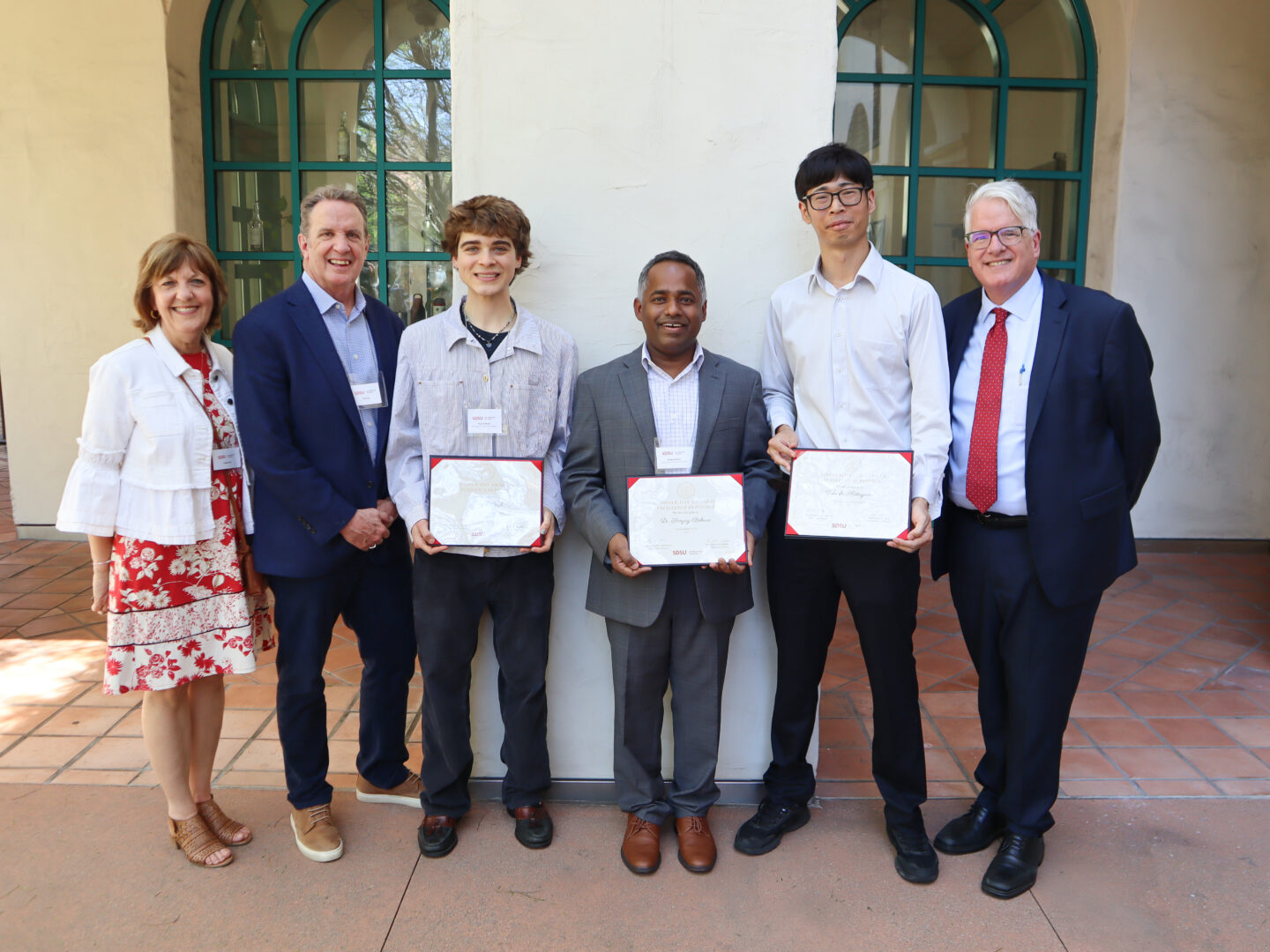
Krista Day, Tim Day, Patrick Bush, Sanjay Behura, Takashi Katayama, Dean Jeffrey Roberts (From left to right) (Bryana Quintana / SDSU)
Congratulations to the recipients of the 2025 Thomas B. Day Award for Excellence in Physics!
This endowment, created in memory of President Day, annually awards one excellent professor and one or more excellent students in San Diego State University’s Physics department. The accolade supports faculty and students financially as they progress in their academic and professional pursuits.
Patrick Bush was selected as the outstanding undergraduate recipient. Bush’s academic achievements and research accomplishments clearly distinguish him. With a perfect GPA, he has pursued advanced topics typically reserved for graduate-level study. His research centers on pseudo-complex general relativity — a novel reformulation of Einstein’s theory that employs complex numbers to investigate the structure of spacetime. This approach offers the potential to uncover new insights into gravity and the behavior of the universe under extreme conditions, work that demands both rigorous mathematical understanding and creative scientific thinking.
In addition, Bush was selected for a highly competitive Research Experience for Undergraduates (REU) at Penn State, where he conducted research on gravitational waveforms from neutron star mergers under the mentorship of Dr. David Radice. He presented his findings at both the Penn State REU Symposium and the Cal-Bridge Fall Conference.
Bush’s research excellence has been recognized nationally through an Honorable Mention from the NSF Graduate Research Fellowship Program (GRFP) and his selection as a Cal-Bridge Scholar, a prestigious program that supports underrepresented students in their path toward PhD studies in physics and astronomy. These honors place him among the most promising undergraduate researchers among his peers.
He is a truly outstanding candidate for the Thomas B. Day Award.
The outstanding graduate recipient is Takashi Katayama. Katayama’s scholarly contributions reflect both depth and originality. He is a co-author on two peer-reviewed publications — one in Astronomische Nachrichten and another in the book Pulsar Astronomy with China’s New Facilities — both addressing advanced topics in astrophysics and gravitational theory. His research focuses on how modifications to Einstein’s theory of general relativity, particularly through f(R) gravity, influence the internal structure of extremely dense stellar remnants such as quark stars.
These modified gravity models are of central interest in theoretical physics because they offer potential alternatives to dark matter and dark energy, aiming to explain cosmological phenomena, such as galaxy rotation curves and the accelerating expansion of the universe, without invoking unknown forms of matter or energy. Katayama’s work demonstrates not only rigorous technical ability but also creative insight in applying abstract theoretical ideas to real astrophysical systems.
His accomplishments have been recognized with multiple honors, including the Outstanding Graduate Award and Outstanding Teaching Assistant Award from SDSU’s College of Sciences. He is also a McNair Scholar, a distinction awarded to high-achieving first-generation students preparing for doctoral-level research, placing him among the most promising graduate scholars at the national level.
In addition to his research, Katayama has made meaningful contributions to the university’s educational mission. As a Teaching Assistant, he led weekly physics lab sections, trained new TAs, and helped revise lab content to align with pedagogical best practices. He also served as an AI content reviewer in physics and mathematics, applying his academic rigor to help train next-generation educational tools.
Katayama’s trajectory is a powerful testament to his perseverance, intellectual drive, and commitment to excellence. He exemplifies the spirit of the Thomas B. Day Award through his impactful blend of research innovation, teaching leadership, and personal integrity.
Professor Sanjay Behura was selected as the faculty recipient. Behura’s achievements in quantum materials research and student mentorship strengthen SDSU’s standing as an R1 research institution. A globally recognized expert in quantum materials and 2D heterostructures, Behura has published more than 40 high-impact, peer-reviewed articles since 2020, including in Nature Photonics, ACS Nano, and Advanced Functional Materials—garnering over 1,500 citations. He is also a named inventor on three patents, including a recent provisional U.S. patent for quantum emitter integration.
Since joining SDSU in 2022, he has secured more than $800,000 in federal research funding as principal investigator, with support from the NSF, AFRL and AFOSR. He has played a pivotal role in mentoring students at every level, with his mentees earning prestigious recognitions such as Thomas B. Day Awards, Cal-Bridge Scholarships, and placements at national laboratories including Oak Ridge and Fermi. Through his research group, Behura has mentored more than 18 SDSU students and high school interns, and currently supervises a postdoctoral fellow along with multiple M.S. and Ph.D. researchers.
He is also a dedicated and effective educator, consistently receiving strong student evaluations across both undergraduate and graduate courses. His inclusive, student-centered approach has made his lab a vibrant environment for scientific inquiry, where students from diverse backgrounds engage in nationally competitive research.
Behura’s leadership extends beyond the classroom and laboratory. He has organized international symposia, served on multiple departmental and university committees, and contributed actively to the advancement of quantum science education. He exemplifies the ideals of the Thomas B. Day Faculty Award through his scholarship, mentorship, and unwavering commitment to student success.
Read more about Thomas B. Day and his contributions to SDSU’s physics community and the university as a whole.